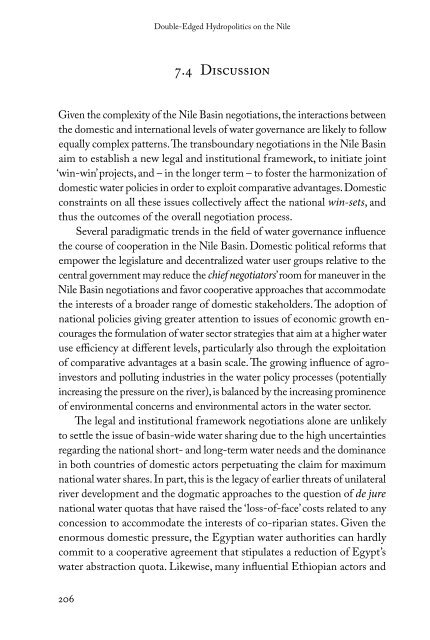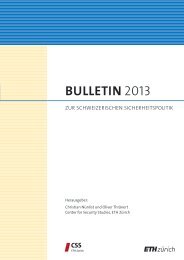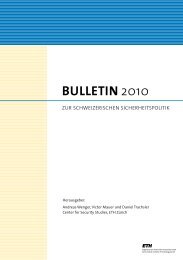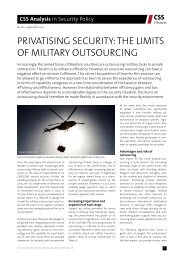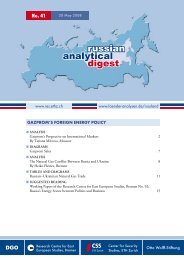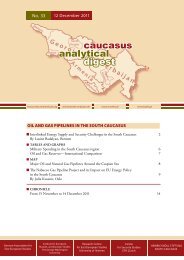Double-Edged Hydropolitics on the Nile - Center for Security Studies ...
Double-Edged Hydropolitics on the Nile - Center for Security Studies ...
Double-Edged Hydropolitics on the Nile - Center for Security Studies ...
You also want an ePaper? Increase the reach of your titles
YUMPU automatically turns print PDFs into web optimized ePapers that Google loves.
<str<strong>on</strong>g>Double</str<strong>on</strong>g>-<str<strong>on</strong>g>Edged</str<strong>on</strong>g> <str<strong>on</strong>g>Hydropolitics</str<strong>on</strong>g> <strong>on</strong> <strong>the</strong> <strong>Nile</strong><br />
7.4 Discussi<strong>on</strong><br />
Given <strong>the</strong> complexity of <strong>the</strong> <strong>Nile</strong> Basin negotiati<strong>on</strong>s, <strong>the</strong> interacti<strong>on</strong>s between<br />
<strong>the</strong> domestic and internati<strong>on</strong>al levels of water governance are likely to follow<br />
equally complex patterns. The transboundary negotiati<strong>on</strong>s in <strong>the</strong> <strong>Nile</strong> Basin<br />
aim to establish a new legal and instituti<strong>on</strong>al framework, to initiate joint<br />
‘win-win’ projects, and – in <strong>the</strong> l<strong>on</strong>ger term – to foster <strong>the</strong> harm<strong>on</strong>izati<strong>on</strong> of<br />
domestic water policies in order to exploit comparative advantages. Domestic<br />
c<strong>on</strong>straints <strong>on</strong> all <strong>the</strong>se issues collectively affect <strong>the</strong> nati<strong>on</strong>al win-sets, and<br />
thus <strong>the</strong> outcomes of <strong>the</strong> overall negotiati<strong>on</strong> process.<br />
Several paradigmatic trends in <strong>the</strong> field of water governance influence<br />
<strong>the</strong> course of cooperati<strong>on</strong> in <strong>the</strong> <strong>Nile</strong> Basin. Domestic political re<strong>for</strong>ms that<br />
empower <strong>the</strong> legislature and decentralized water user groups relative to <strong>the</strong><br />
central government may reduce <strong>the</strong> chief negotiators’ room <strong>for</strong> maneuver in <strong>the</strong><br />
<strong>Nile</strong> Basin negotiati<strong>on</strong>s and favor cooperative approaches that accommodate<br />
<strong>the</strong> interests of a broader range of domestic stakeholders. The adopti<strong>on</strong> of<br />
nati<strong>on</strong>al policies giving greater attenti<strong>on</strong> to issues of ec<strong>on</strong>omic growth encourages<br />
<strong>the</strong> <strong>for</strong>mulati<strong>on</strong> of water sector strategies that aim at a higher water<br />
use efficiency at different levels, particularly also through <strong>the</strong> exploitati<strong>on</strong><br />
of comparative advantages at a basin scale. The growing influence of agroinvestors<br />
and polluting industries in <strong>the</strong> water policy processes (potentially<br />
increasing <strong>the</strong> pressure <strong>on</strong> <strong>the</strong> river), is balanced by <strong>the</strong> increasing prominence<br />
of envir<strong>on</strong>mental c<strong>on</strong>cerns and envir<strong>on</strong>mental actors in <strong>the</strong> water sector.<br />
The legal and instituti<strong>on</strong>al framework negotiati<strong>on</strong>s al<strong>on</strong>e are unlikely<br />
to settle <strong>the</strong> issue of basin-wide water sharing due to <strong>the</strong> high uncertainties<br />
regarding <strong>the</strong> nati<strong>on</strong>al short- and l<strong>on</strong>g-term water needs and <strong>the</strong> dominance<br />
in both countries of domestic actors perpetuating <strong>the</strong> claim <strong>for</strong> maximum<br />
nati<strong>on</strong>al water shares. In part, this is <strong>the</strong> legacy of earlier threats of unilateral<br />
river development and <strong>the</strong> dogmatic approaches to <strong>the</strong> questi<strong>on</strong> of de jure<br />
nati<strong>on</strong>al water quotas that have raised <strong>the</strong> ‘loss-of-face’ costs related to any<br />
c<strong>on</strong>cessi<strong>on</strong> to accommodate <strong>the</strong> interests of co-riparian states. Given <strong>the</strong><br />
enormous domestic pressure, <strong>the</strong> Egyptian water authorities can hardly<br />
commit to a cooperative agreement that stipulates a reducti<strong>on</strong> of Egypt’s<br />
water abstracti<strong>on</strong> quota. Likewise, many influential Ethiopian actors and<br />
206


